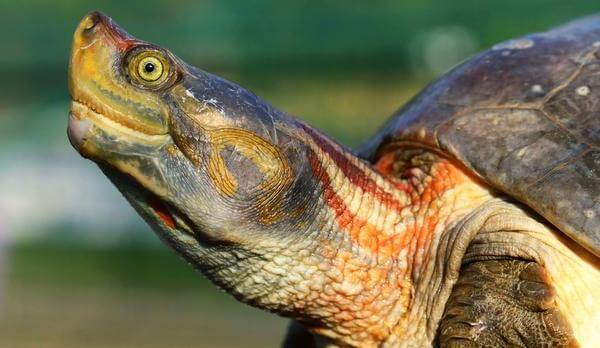Red Crowned Roofed Turtle | 02 May 2025
Why in News?
The Red Crowned Roofed Turtle has returned to the Ganga River after an absence of three decades .
- This success is a historic biodiversity conservation achievement under the Namami Gange Mission and the Turtle Survival Alliance India (TSAFI) project.
Key Points
- About the Red Crowned Roofed Turtle:
- Scientific name: Batagur kachuga.
- Common Names: Bengal Roof Turtle, Red Crowned Roofed Turtle.
- About:
- The Red Crown Roofed Turtle is one of the 24 species endemic to India , the males of which are characterized by bright colours like red, yellow, white and blue on the face and neck.
- Distribution:
- It is a freshwater turtle species found in deep-flowing rivers with nesting sites.
- Historically the species was widespread in the Ganges River in both India and Bangladesh. It is also found in the Brahmaputra basin.
- Currently the National Chambal River Gharial Sanctuary in India is the only area that has a significant population of the species, but this protected area and habitat are also now under threat.
- Large coastal and riverine projects disrupt river flow and increase water pollution.
- Subpopulations suffer due to entanglement in fishing nets and disturbances from human activity.
- Pollution, irrigation-related water extraction, and unregulated dam flows degrade natural habitats.
- Sand bar habitats used for hunting are shrinking due to increased mining and seasonal agriculture along the Ganga River.
- Overharvesting for illegal consumption and international wildlife trade poses a serious threat.
- Protection Status:
- International Union for Conservation of Nature (IUCN) Red List : Critically Endangered
- Wildlife Protection Act (WPA), 1972: Schedule I
- CITES : Appendix II
- Rehabilitation
- The turtles were released in the Haiderpur wetland in Uttar Pradesh . This area is located along the river Ganga and its ecosystem was considered suitable for the rehabilitation of turtles.
- The turtles were divided into two groups – one was released in the upper part of the Ganga Barrage and the other in the lower part.
- Each turtle is fitted with a tracking device to monitor their movements and adaptation to the environment.
- The turtles were released in the Haiderpur wetland in Uttar Pradesh . This area is located along the river Ganga and its ecosystem was considered suitable for the rehabilitation of turtles.
Turtle Survival Alliance India (TSAFI)
- TSAFI represents the Indian chapter of the global Turtle Survival Alliance, which is committed to protecting freshwater turtles and tortoises worldwide.
- It works to safeguard turtles and tortoises from major threats such as habitat destruction, illegal wildlife trade, and the impacts of climate change.
- The organisation undertakes diverse initiatives, including:
- Scientific research on turtle species and habitats
- On-ground conservation projects
- Public education and awareness campaigns
- TSAFI aims to ensure the long-term survival of turtle species in India by combining community involvement with scientific expertise.
National Chambal Sanctuary
- The National Chambal Sanctuary, located at the trijunction of Rajasthan, Madhya Pradesh, and Uttar Pradesh.
- It is a fragile lotic ecosystem, which is a critically important breeding ground for gharials - fish-eating crocodiles.
- The sanctuary is protected under the Wildlife Protection Act, 1972, and is listed as an ‘Important Bird and Biodiversity Area’.
- The sanctuary is also a proposed Ramsar site, and over 320 species of resident and migratory birds inhabit the area.
Namami Gange Programme
- Namami Gange Programme is an integrated conservation mission, approved by the Central Government in June 2014 as a 'Flagship Programme' to achieve the twin objectives of effective abatement of pollution and conservation and rejuvenation of the National River Ganga.
- It is being operated under the Ministry of Water Resources, Department of River Development and Ganga Rejuvenation and Ministry of Jal Shakti .
- In the second phase of Namami Gange Programme (2021-26), the states will focus on speedy completion of projects and preparation of credible Detailed Project Reports (DPRs) for projects in Ganga tributary towns.
- Attention is also being paid to the revival of small rivers and wetlands.


.jpg)